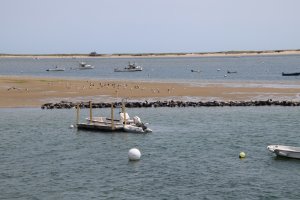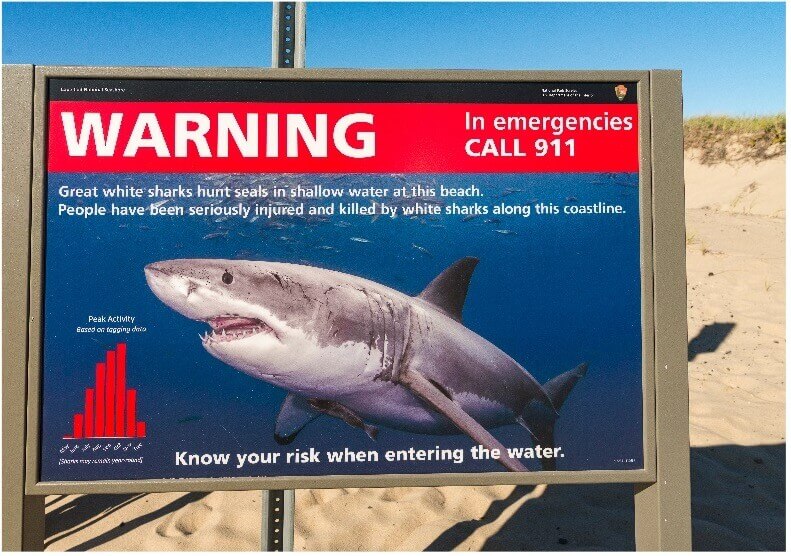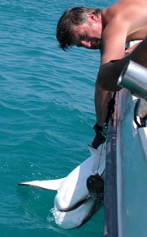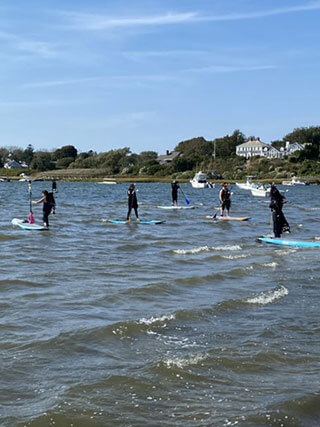People think that the main danger you can face while swimming in the Cape waters, is the abundance of sharks and want to know if it is safe to swim on Cape Cod??
 The number of sharks on Cape Cod has been on the rise since protective legislation in the 90s and the booming population of their prey, the grey seal. However, a study by the World Animal Foundation found that the chances of fatal shark attack (1 in 4,332,817) are lower than drowning or other beach accidents (1 in 2 million).
The number of sharks on Cape Cod has been on the rise since protective legislation in the 90s and the booming population of their prey, the grey seal. However, a study by the World Animal Foundation found that the chances of fatal shark attack (1 in 4,332,817) are lower than drowning or other beach accidents (1 in 2 million).
Despite increased shark numbers, the chances of you getting attacked are meager. However, since shark attacks can be very harmful, even fatal, it’s best to take safety precautions when in the water.
Let’s take a further look into the facts and decide if swimming and surfing in Cape Cod waters are safe enough or not and what safety measures, we can take to prevent any mishaps from happening.
Are Cape Cod beaches dangerous?
Since 2016, there have been 718 reports of shark activity at Cape Cod beaches which is higher than ever. And since these sharks spend 47% of their time in 15 feet deep (or less) water, Cape Cod beaches can be dangerous if you venture too deep into the ocean.
Sharks are common in Cape Cod waters, inhabiting the Outer Cape and areas like Chatham where their prey, the grey seal, is in the 10,000s.
The number of sharks on Cape Cod has increased to such an extent that the Cape Cod National Seashore waters had to be closed to swimming for an hour at least 27 times in 2018 and an average of 13 times a year since 2013 as a safety precaution.
So, while shark numbers have gone up, chances of getting attacked are still low. When sharks do attack, it’s usually a case of them mistaking you for their prey–an accident.
Since 2010, there have been several intense shark attacks on unsuspecting swimmers, some of which resulted in lacerations to the body and even proved to be fatal.
The bottom line is that one must continue to keep taking safety precautions to avoid any unfortunate accidents.
How do you avoid sharks on Cape Cod?
To avoid sharks, you should try to swim in shallow waters because sharks spend 47% of their time in 15 feet or deeper waters. You should also check out beach signage  and the flag warning system (purple for sharks). Try to avoid fishing areas because the smell of bait and struggling fish attract sharks to those regions.
and the flag warning system (purple for sharks). Try to avoid fishing areas because the smell of bait and struggling fish attract sharks to those regions.
- Avoid the Seals – Seals are a natural meal for sharks, and you’re not. It is best to avoid areas where seals are more abundant, or else a shark may mistake you for its food.
- Swim Close to Shore – It is pretty unlikely that a shark will be close to shore when the beach is crowded. Even if one is, you can safely get to shore because it would be close by. Try to swim in areas where your feet can still touch the waterbed.
- Swim in Clear Water – Murkier water not only hinders your ability to see danger in the water but also affects the shark’s eyesight. It can be challenging for them to differentiate between their prey and you in murky waters, resulting in an unwarranted attack.
- Swim in Groups – Logically, doing so can provide you with an extra set of hands if you fall prey to a shark. If something goes wrong, one of you–if they happen to escape–can get help.
- Do not Swim Alone at Dawn or Dusk – Sharks tend to hunt their prey when there is low light. Avoid going into the water during those times.
- Avoid Jewelry – Sharks can confuse shiny jewelry for fish scales. Consequently, it is better if you avoid wearing any on the beach.
- Understand the Beach Flag Warning System – Cape Cod beaches implement a Beach Flag Warning System that lets you know if there are any sharks in the water. If you see a purple sign, it means sharks are in the water. A red warning means it’s not safe to swim.
- Don’t Provoke them – Sharks aren’t out to get you–you aren’t a part of their diet. They tend not to bother you if you don’t bother them. But if you provoke them, you could risk getting hurt.
Are there any safety measures against sharks on Cape Cod beaches?
Cape Cod has aligned with the Regional Shark Working Group to increase knowledge, awareness, and safety regarding shark presence in the waters.
They have implemented beach signage, a flag warning system, brochures, a shark smart video to raise awareness, and the sharktivity app, which allows you to track the real-time location of sharks on Cape Cod waters.
Beach signage includes signs like “Swim at Your Own Risk” when lifeguards aren’t present or shark warnings.
The Flag Warning System helps tell you when it’s not safe to enter the water (red flag) and when there is a risk of sharks (purple flag).
How many shark attacks have there been in Cape Cod?
Since 2010, there have been five shark attacks on the coasts of Wellfleet, Truro, and Falmouth that resulted in either no injury, lacerations, or death. The fatal shark attack occurred in 2018 on the coast of Wellfleet, where 26-year-old Arthur Medici was mauled by a shark while boogie boarding.
In 2017 and 2018, several people suffered lacerations to the body from unprovoked shark attacks.
Here’s the overview:
- In 2012, a shark attacked Denver resident Chris Myers while he was on a channel. Chris suffered lacerations to his legs below his knees but managed to fight back to free himself. He had to undergo surgery.
- In 2017, there were two occurrences–one at Falmouth and the other at Wellfleet. One of them was provoked when a 34-year-old man caught a small shark, and as he was removing it from his fishing rod, it fell on his foot and bit it.
- The other 2017 attack happened when an unprovoked shark attacked a 69-year-old man in about 3-4 feet of water. He escaped uninjured, but the shark damaged his board.
- In 2018, a man bore lacerations to the leg, hip, and hand when swimming in Longnook Beach waters in Truro. He had been swimming near the seals in waters above his head. He was released after two weeks’ treatment at a hospital.
- That same year, the fatal incident concerning 26-year-old Arthur Medici occurred at Newcomb Hollow Beach in Wellfleet. The man was boogie boarding when a shark attacked him, injuring him fatally. He succumbed to his wounds in the hospital.
Are shark attacks common?
 While there has been an increased number of shark attacks in the Cape Cod region, a study finds a higher chance of drowning or suffering another beach-related fatality (1 in 2 million) than being attacked by a shark (1 in 11.5 million).
While there has been an increased number of shark attacks in the Cape Cod region, a study finds a higher chance of drowning or suffering another beach-related fatality (1 in 2 million) than being attacked by a shark (1 in 11.5 million).
However, one should still take safety precautions when in the water, especially if swimming in the Outer Cape or near areas like Chatham, where sharks are most common.
Shark Attacks have been most frequent in recent years.
Most attacks happen by accident and without provocation.
Sharks can occasionally confuse their prey with actual humans–whether that’s due to poor sight in cloudy waters or the person’s proximity to a fishing region (e.g., piers), or some other reason.
Greg Skomal, a leading biologist at the Division of Marine Fisheries, and his team have been tracking sharks and have found that they frequent Nauset Beach (3800 detections from 64 sharks) and North Truro (14,000 detections off 53 sharks).
According to the Atlantic White Shark Conservancy, 718 sightings have been reported on the sharktivity app at Cape Cod.
With sharks frequenting the waters of Cape Cod–especially Chatham beaches and the Outer Cape–due to an increase in the number of seals (their prey), the chances of attacks also increase.
But we shouldn’t blow this out of proportion…
According to stats, a shark attack occurs every 730 million visits, which means there is a 1 in a billion chance of you getting attacked by one.
Conclusion- it is Safe to Swim on Cape Cod
To sum up, the number of sharks on Cape Cod has been increasing due to federal laws that prevent their prey (seals) from being hunted.
Ever since grey seals have been protected under the US Marine Mammal Protection Act, their numbers have risen immensely, and they tend to populate the New England waters most often.
Since sharks feed on these seals, they are also found to frequent these areas in large numbers.
While populations are high, research says that the chances of you getting attacked by a shark are 1 in a billion and that you’re more likely to drown or be hit by lightning.
But then an incident like the one at Wellfleet beach occurs, and the statistics don’t matter anymore. So, your best bet is to take all necessary safety precautions when getting into the water.
We hope this guide was helpful. For more information, read “Why Do Sharks Go to Cape Cod?”. If you have any questions, let us know in the comments!














This Post Has 9 Comments
Most fantastical experience has been the dearth of any real action by authorities on the outer cape to improve your safety with an APEX PREDATOR likely very near or present where you are swimming. This is well borne out by even the limited statistical evidence provided by the authorities. Even more amazing is the absence and lack of any frequency of site visits to marine side communities around the world such as South Africa or Australia where the Great Whites are also frequent hunters. These countries have had some success in diverting this shark population. To the Town of Wellfleet MA don’t even think of buying Maurice’s Campground with its thirty five cess pools the huge price to buy the property and then update the septic system will be more than should be spent; while the illusion of public safety is all that separates the shark from swimmers.
So sharks spend 47% of their time in 15 feet of water or less but it also days 47% in 15 feet or deeper. So where do they spend the other 6%. Not on dry land I’m certain! And not likely in the air while breaching. Sharks are indeed mysterious.
BTW: it’s Greg Skomal, not Skomar.
Thanks for the correction to Dr. Skomal.We have edited.
Pingback: Great White Sharks In Cape Cod - Why Are Sharks Coming
Pingback: Where To Surf: Top 10 Best Surfing Beaches On Cape Cod
Tell rhe truth, the Cape is doomed for swimmers. No swimmer should wear Black.
Tell the truth- it is seriously dangerous, with great Whites sharks near, to swim at cape cod beaches.
That is a reason there are so many vacancies.
Pingback: Chatham Shark Center - Atlantic White Shark Conservancy
Pingback: Can I Swim In Cape Cod? - Cape Cod Beaches | Cape Cod Xplore